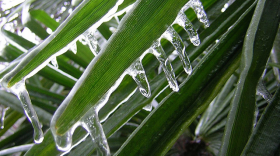Marie da Silva is among the 25 percent of voters who are undecided ahead of Sunday's first round of voting in France's crucial presidential election.
The 52-year-old building manager and mother has soured on the men in the race, finding them too weak, unrealistic or communist.
Though she identifies as conservative, da Silva had never voted for the far-right party, National Front.
But after watching its leader and presidential candidate, Marine Le Pen, give a red-meat speech against globalization, the European Union and immigration to a packed auditorium in Paris, da Silva said she found a woman she can believe in.
"Marine has the strength and charisma of a man," da Silva declared. "She raised her children. She's a superwoman, a responsible woman, a woman who charges in."
Le Pen knows the women's vote is crucial in her quest to become France's first female president — in a topsy-turvy race where tight competition means the winner is really anyone's guess at this point.
But Le Pen and her party have baggage. The National Front wasn't exactly attractive to women when Le Pen's controversial father, Jean-Marie, ran it. He was an aging, macho former paratrooper who called the Holocaust "a minor detail" in history and wanted women to stay home and procreate.
"What he said about women was barely acceptable to those who did not belong to his generation," says Jean-Yves Camus, a political scientist and author of Far Right Politics in Europe. "Marine Le Pen is a modern woman. I mean, she raised her kids independently. She's divorced, two times. So it probably gives the possibility of being heard by modern women."
Camus cites various studies showing that the percentage of women voting for the National Front increased from 10 percent in 2010 to 28 percent in 2015. The increase is more pronounced among working-class women. Camus adds that more men than women support the party, though some studies show that gap narrowing under Le Pen's leadership.
Marie-Hélène De Lacoste Lareymonde, a National Front lawmaker from Alsace, claims that Le Pen, a husky-voiced, hard-edged lawyer in a pantsuit, represents "every kind of woman in society."

During the presidential campaign, Le Pen has tried to show a soft side.
Her logo is a blue rose. Her campaign has distributed copies of a glossy four-page leaflet reminding voters that she's a mother of three who's "a female politician in a man's world."
And in a campaign video, she declares that, as a woman, she's experienced the "ever-increasing restrictions in our country through the development of Islamic fundamentalism like an act of violence."
That issue is one reason why Manon Bouquin, a 24-year-old student, decided to campaign for Le Pen.
At the Paris rally, she hands out T-shirts with one hand and waves a French flag with the other.
"Marine Le Pen warned years ago that Islamism is segregating men and women in the Paris suburbs," Bouquin says, claiming "that there are even cafes where women can't enter."
Another woman at the rally, 19-year-old Morgane Fleury, says she stopped by the Le Pen rally out of curiosity and was shocked at Le Pen's "violent" rhetoric.

Fleury says Le Pen is trying to scare women into supporting her by demonizing Islam.
"She's just so bad for women, and the way she talks about women and Islam, it's terrifying, really," Fleury said. "There's a hidden meaning in what she says."
Camus, the political scientist, says his research shows that Le Pen used anti-Islamic rhetoric, especially after the terrorist attacks in Paris and Nice, to attract women who didn't vote for the National Front before.
"And she tells the same thing to gay people and to the Jews," he says, "Telling them 'forget what we did in the past, and that if you want to be protected, the National Front is best for you'."
NPR's Eleanor Beardsley contributed to this story.
Copyright 2020 NPR. To see more, visit https://www.npr.org. 9(MDAyMTYyMTU5MDEyOTc4NzE4ODNmYWEwYQ004))









